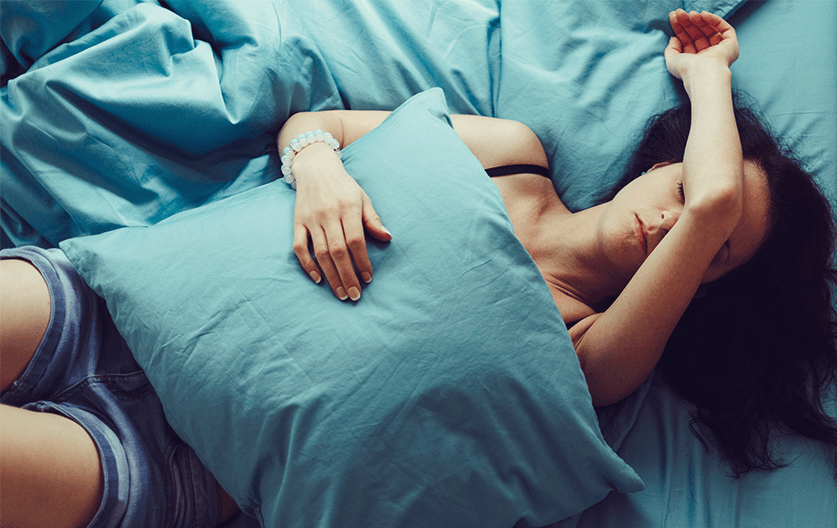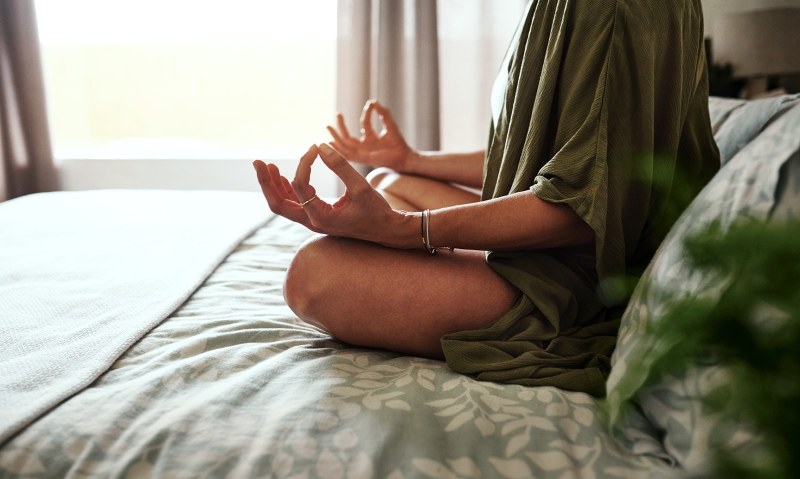- Home
- Mind & body
- How to manage sleep anxiety
At CBHS we help you manage your health challenges. We believe in offering you the services, support and tools you need to live your best life.
Health and Wellness Programs are available to support eligible members towards a healthier lifestyle. Each Health and Wellness Program is subject to its own eligibility criteria.
Contact us for more information and to confirm your eligibility for a program.
How to manage sleep anxiety

For a lot of Australians, anxious feelings can also come at night causing interrupted sleep, loss of energy and fatigue. However, sleep anxiety can do more than just affect your energy levels and have you reaching for your third coffee: it can seriously affect your health and wellbeing.
If you’re struggling with sleep issues, you’re not alone. In fact, according to the Sleep Health Foundation, sleeping problems in Australia are very common and affect between 33-45% of adults across all age groups. They also cost the healthcare system over $800 million and
indirectly result in $4.3 billion in lost productivity, absenteeism, and expenses relating to car accidents.
At the milder end of the consequence spectrum, 17% of people have missed work due to sleeping issues and 17% have actively fallen
asleep on the job. The more serious end of this spectrum is shocking, with 29% of people reporting they’ve driven while drowsy, 20% have fallen asleep while driving, and 5% have been involved in accidents after falling asleep at the wheel.
Most adults need between seven to nine hours of sleep each night – but children and teenagers need even more. If you’re not getting close to eight hours each night, there are diet and lifestyle changes you can make to improve your chances of enjoying a better night’s rest.
Regular exercise
And it needn’t be high-intensity exercise or a marathon run! Regular exercise promotes sleep in two ways:
- Exercise is tiring.
Physical activity like a gym class, brisk walk or even a yoga class can tire you out. The combination of ‘damaged’ muscles and energy consumption means that your body needs to rest to recover. You’ll feel drowsier at bedtime and more inclined to fall into a deeper sleep. - Exercise regulates moods.
Even if you don’t break out into a sweat during exercise, simply moving your body has been shown to help manage anxiety and depression.
Keep in mind that exercise primes your body for action so it can take a while for all the physiological changes to subside. That’s why it’s a good idea to finish your exercise class or routine at home at least one hour before you go to bed.
Healthy diet: obesity is linked to poorer sleep
If you’re overweight or your GP has diagnosed you as obese, this could also be a reason why you’re not sleeping well at night. People with obesity report sleeping longer hours however quantity doesn’t necessarily equate to quality. If you think your weight issues are a symptom of a different problem, like depression, anxiety or your living circumstances, it’s best to speak with your GP who may refer you to a therapist for greater guidance and support.
Making small changes to your diet like swapping processed foods for fruit and veggies, and scheduling half an hour to an hour of intense exercise per day, can help address obesity and potentially any other factors that might be related.

“Exercise, meditation, a healthy diet and a regular bedtime routine can help you enjoy a deeper night’s sleep.”
Limit your caffeine
Caffeine isn’t necessarily ‘the bad guy’ when it comes to getting a good night’s sleep. So, if you enjoy it in low to moderate doses, caffeine can help you feel alert and even improve your concentration and problem-solving skills. Moderation is the key because caffeine also blocks the chemicals in the brain that promote sleep and while this feels great in the morning, it means you may find it harder to fall asleep and stay asleep at night. It’s true that some people can enjoy a latte after dinner at night and have no issue at bedtime, but this is not common. That’s why it’s a good idea to avoid caffeine altogether close to bedtime to ensure you get a good night’s sleep.
Avoid watching screens, or using devices in bed
If your room doubles as your recreational space, you might want to think about getting more use out of your living room. Your body and mind adjust to your environment, meaning that your brain might see your bed as the place to watch tv, play games or look at your phone. The closer the association between your bedroom and sleep, the more likely you'll feel like sleeping the moment you get into bed.
Consistent sleep and relaxation times
Setting up a regular bedtime ritual – and sticking to it – can help you feel more relaxed and ready for sleep. Your routine might involve a soothing drink and a book, meditation, or even some light stretching. Whatever you choose, it’s all about getting yourself into a routine that will help prepare your body for sleep.
You also might like to try:
- relaxing music
- listening to natural sounds like rain
- practicing mindfulness.

Write your thoughts down
If you’re waking frequently during the night with anxious thoughts, don’t roll over and grab your phone or tablet. Try to relax and accept you can’t sleep in that moment. Feeling stressed or frustrated will increase your cortisol levels and keep you awake for longer. If your thoughts are troubling you, try jotting down your anxieties in a journal.
The key is to get it all out on paper and calm your mind before sleep. You can also practice a mindfulness activity to keep your thoughts grounded in the present.
“Caffeine in small quantities can help you feel alert and more focused during the day – but try to avoid it just before bedtime.”
Sleep is an important part of a healthy lifestyle
If you feel like the pace of your life and your emotional health are having a negative impact on your sleep – reach out for help.
The first step is scheduling in time with your GP. They’ll assess your situation to see if there are any underlying causes for your sleeping issues. They can also suggest strategies and methods to help you. They may even suggest a referral to a sleep specialist or mental health professional for further support. If you’re currently experiencing issues with your mental health and need immediate support, get in touch with one of the following services:
- Lifeline on 13 11 14
- Beyond Blue on 1300 22 46 36
- MensLine Australia on 1300 789 978
Whether you’re struggling with sleep anxiety or general emotional health issues, it’s important to ask for help when you need it. Remember, you’re never alone.
All information contained in this article is intended for general information purposes only. The information provided should not be relied upon as medical advice and does not supersede or replace a consultation with a suitably qualified healthcare professional.
Sources:
https://www.healthdirect.gov.au/sleep
https://www.sleepfoundation.org/bedroom-environment/how-to-design-the-ideal-bedroom-for-sleep
https://www.sleephealthfoundation.org.au/caffeine-and-sleep.html
https://www.sleephealthfoundation.org.au/pdfs/surveys/SleepHealthFoundation-Survey.pdf
https://www.healthdirect.gov.au/healthy-sleep-habits
https://www.healthdirect.gov.au/10-tips-for-healthy-sleep
Health and wellbeing
programs & support
You Belong to More with CBHS Hospital cover:
- Greater choice over your health options including who treats you
- Get care at home with Hospital Substitute Treatment program
- Free health and wellbeing programs to support your health challenges
Live your healthiest, happiest life with CBHS Extras cover:
- Benefits for proactive health checks e.g. bone density tests, eye screenings
- Keep up your care with telehealth and digital options
- Save on dental and optical with CBHS Choice Network providers
